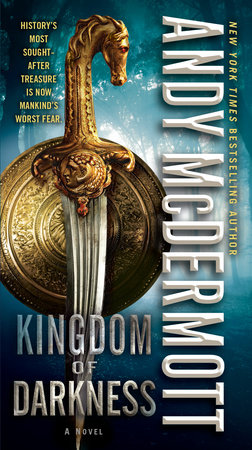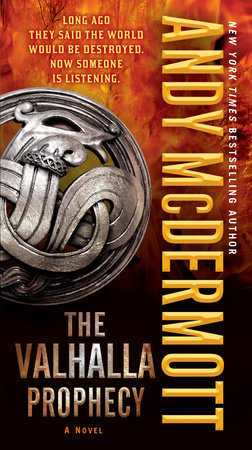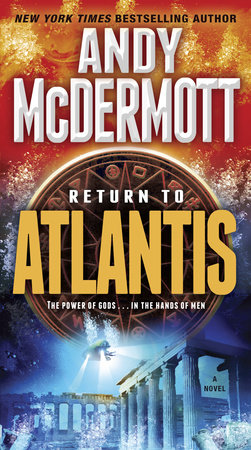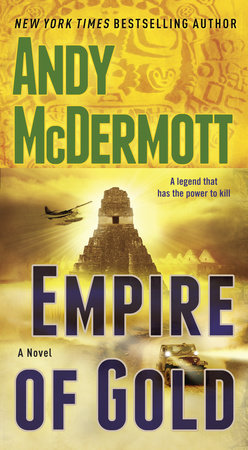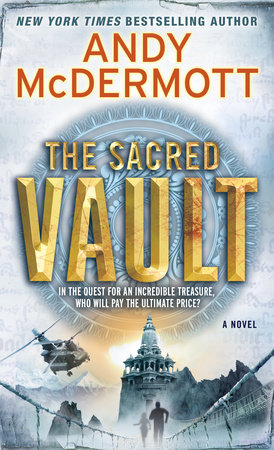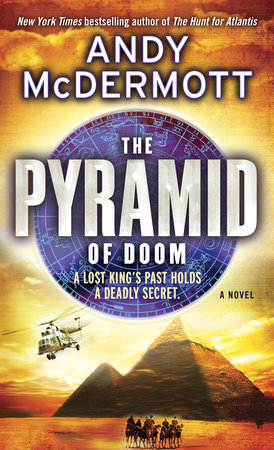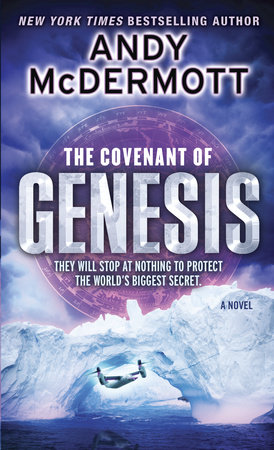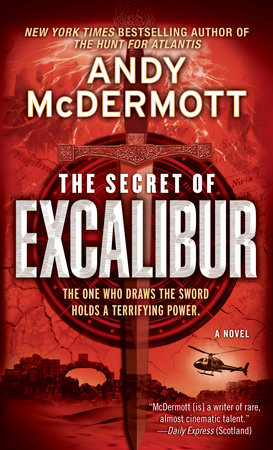Excerpt
The Midas Legacy
1
Forty-Four Years Later
Nina Wilde gazed in wonderment at the ruins of Atlantis rolling past beneath the submersible. Ten years had passed since she’d discovered the lost civilization, using the lifelong work of her parents, Henry and Laura Wilde, as the foundations of her own research. The intervening decade had seen others join the task of excavating the wonders lost for eleven millennia, what had once been a rolling expanse of silt eight hundred feet beneath the Atlantic now dotted with buildings, many still surprisingly intact despite the earthquake and deluge that had dropped an entire island below the waves. It was an incredible sight.
But to her frustration, she wasn’t seeing it in person.
The submersible was relaying the images picked out by its spotlights and laser scanners up an umbilical cable to a research vessel above, which in turn was transmitting them to an operations center in the offices of the International Heritage Agency at the United Nations in New York. As much as Nina desperately wanted to revisit the site, she had—with deep reluctance—settled for watching the expedition unfold on a screen several thousand miles away. Adding to her annoyance, her husband was aboard the submersible . . . despite not especially wanting to be there.
“Wish you’d kept up your dive certification,” said Eddie Chase over the comm system, his deep voice with its broad Yorkshire accent reverberating inside his spherical acrylic helmet. “Then you could be freezing your bum off down here while I sit around drinking coffee in a nice comfy chair.”
“You remember what the IHA’s office chairs are like, right?” Nina replied, a little tersely. “And, y’know, having a baby kind of affected our priorities. You missed those new Star Wars movies; I didn’t qualify to use a new version of a deep submergence suit. Not that I needed some certificate when I was running the IHA,” she added, with a glance at the man beside her. “I just learned how to use the thing, then used it.”
Dr. Lester Blumberg peered over his horn-rimmed glasses with a patronizing smile. “Yes, but we’re a lot less—how shall I put it?—improvisational now than when you were in charge, Nina. Everyone needs proper training and certification for any IHA operation. Health and safety, you know.”
“Yeah, I know.” Nina’s own smile was decidedly lacking in both humor and warmth. After her resignation almost four years previously, the post of director of the IHA had eventually been filled by the Minnesotan. Blumberg would not have even made it onto her short list, as she considered him merely competent at best—safe and unimaginative, a plodder—but she’d had no say in his appointment.
She turned her attention back to the screens. The main display showed a pilot’s-eye view of the submersible’s voyage, but one of the smaller monitors flanking it had an angle on one of its passengers, standing on a landing skid: Eddie. “How much farther?” he asked.
An Australian voice came over the comm. “Be there in about three minutes,” said the couple’s friend Matt Trulli from inside the sub. It could accommodate three, but today he was the only person in the cabin, making it far less cramped than normal.
The two men holding on to its hull had no such luxuries. On the other skid was a second diver, Nerio Cellini. The Italian was young, only in his mid-twenties, but he already had years of experience in underwater exploration. His enthusiasm made Nina nostalgic for the time when she had been filled with the same youthful vigor, and also a little jealous of it.
“I see the site,” Cellini reported.
Nina looked back at the main monitor. The blue-green lasers used to pierce the water’s murky cloak had the side effect of leaching away all color except an eerie turquoise, but a small patch of white faded into sight at the screen’s center. “That’s it?” she asked Blumberg.
“That’s it,” he replied. “The Temple of Poseidon.”
The glow came from powerful spotlights standing on the roof of a massive structure rising from the seafloor. Even in ruins, the centerpiece of the lost city was still awe inspiring. When Nina had first discovered it, the great temple had been largely buried by silt. Most of the surrounding sediment had since been cleared, but the building itself had suffered massive damage when her survey ship was deliberately scuttled and smashed down on top of it. Some of the RV Evenor’s remains were still in place, the wreck too big and costly to remove entirely. But parts had been cut away to give access to what remained of the temple.
The submersible approached the northern end of the huge vaulted ruin. The lights encircled an area where the damaged roof had been carefully opened up. Beneath it was the altar room, not merely a place of religious importance but also an archive: The entire history of the Atlantean civilization was recorded within, scribed into the sheets of gold alloy covering the walls. Some had been lost when the ceiling collapsed, but others were still intact, including an account of the doomed civilization’s last hours.
It was a different record that the expedition hoped to discover, however.
“Matt, move to drop-off position,” Blumberg ordered. “Nerio, Eddie, you’re up.”
The submersible stopped above the ring of lights, pulsing its thrusters at low power to hold position against the ocean’s slow but relentless current. “Okay, guys, we’re here,” said Matt. The two divers each collected an equipment case, then Eddie leaned his shaved head closer to the camera and grinned at Nina, revealing the gap between his two front teeth, before stepping off the skid.
“Good luck,” she told him.
•••
“Hope we don’t need it,” Eddie replied. The deep suit—comprising a hard casing around his body that let him breathe air at normal atmospheric pressure to eliminate any risk of the bends, heavy-duty seals at the shoulders and hips allowing his dry-suited limbs to move freely—was neutrally buoyant, but the case was heavy enough to let him drift lazily downward. A spool of hair-thin fiber-optic communications line played out behind him, keeping him in direct contact with the sub and the IHA. His feet made gentle contact with the ancient stone. “Touchdown! It didn’t collapse, so that’s a good start.”
Cellini landed a few feet away. “This part of the temple should be very stable,” he said. “Only below the altar room is it . . .” He searched for the best English word, waggling his free hand from side to side. “Wobbly.”
“And guess where we’re going.” Eddie sighed. He became more serious as he surveyed his surroundings.
He had visited the altar room before, as well as near-identical copies the Atlanteans had built after abandoning their homeland, one in a vast cavern within a Himalayan mountain, the other deep in the jungles of Brazil. The archaeologists cataloging the lost city on the Amazon had since discovered more chambers beneath its altar room—not hidden, exactly, but neither had they been immediately obvious. Meanwhile, the teams exploring Atlantis itself had uncovered references to a previously unknown treasure held somewhere within the Temple of Poseidon, and all the clues pointed to one of those secondary rooms.
There were two problems. The first was that nobody was sure if the Brazilian temple’s chambers were exact duplicates of the original—sonar searches suggested open spaces beneath this altar room, but the results were far from conclusive. The second, and bigger, was that even if they existed, the Evenor’s destructive landing had dropped countless tons of debris into the temple’s interior, making it impossible to know what was beneath.
Until someone remembered that Nina and Eddie had been inside the temple while it was still intact . . .
There was a camera mounted on the Yorkshireman’s right shoulder. “Nina, you seeing this?” he asked.
“Yes, all looking good,” his wife replied. “I can see the stairs.”
An opening in one wall descended into darkness. The rubble blocking it had been removed, only for the IHA’s explorers to find another, more solid obstruction farther down. Small underwater drones had been able to squeeze past it to confirm that the stairway continued beyond, but they in turn were stymied by further debris. To the frustration of their controllers, the second blockage looked loose enough to be cleared by hand, but the little robots lacked the power to do so.
Which was why, the previous day, Cellini and another diver had used precision explosive charges to split apart the first obstacle. The blast had stirred up debris and sediment, turning the water in the tunnel completely opaque. It had now settled, so he and Eddie could determine if the stairway was passable and, if so, explore its depths.
The Italian gestured to his dive partner. “Are you ready?”
“Sure,” Eddie replied. “I’ll try not to wreck the entire place.” He smiled to reassure the younger man, who clearly knew his reputation.
Blumberg’s voice came through his earpiece. “That would be appreciated this time.”
“Twat,” said Eddie under his breath, though deliberately just loud enough for his microphone to pick it up. The IHA’s director was making an implied criticism of his predecessor and her husband; despite their best efforts, the Temple of Poseidon was far from the only archaeological site to be seriously damaged after Nina had discovered it.
“What was that?”
“Must have been a fish farting. Okay, Nerio, let’s go.”
Eddie used the controller stalk attached to the deep suit’s chest to start its ducted propellers, gliding at low speed to the entrance. Cellini touched down beside him, directing his suit’s lights down the steeply sloping passage. Stone steps receded into the murk for about twenty feet before the path came to an abrupt halt.
A huge stone slab had been dislodged from the ceiling, pulverizing everything beneath it. It had originally come to rest at an angle, leaving a gap just big enough for the drones. Now, though, the space was much larger. The explosives had split the great block in two, the lower half dropping onto the steps and the upper wedging against it.
Rather than use the thrusters, Eddie carefully walked to the slab and took a powerful handheld light from his case, shining it over the carved stone. It looked as if the divers could swim past—but first there was a question that had to be answered.
Cellini voiced it. “Is it safe?”
“Who am I, Dustin Hoffman?” Eddie waited for a reply, but got only a bemused stare from the young man. “You haven’t seen Marathon Man?” Another blank look. “You haven’t even heard of . . . Oh, I give up. Kids today!”
“Just wait until our kid’s older,” Nina joked. “Macy’ll be like, ‘Dad, all your cultural references are from the twentieth century! Mom’s the archaeologist, not me.’ ”
“I dunno, if ever a kid was destined to follow in her mother’s footsteps . . .” He used his hands to test the blocks. They stayed firm.
Cellini added his torchlight to the Englishman’s. “So we will fit, yes? Help me through.” He swam to the gap. “Is my suit clear?”
Eddie checked. There would only be a small space between the suit’s fiberglass casing and the stone. “Roll on your right so you don’t bang your air tank cover on the ceiling.” Cellini did so. “Okay, try to get through. Don’t use your legs—I’ll push you.”
Bracing himself, he carefully assisted the other man into the opening. Despite their best efforts, the suit scraped against the tight surrounds, with a tense moment when the control stalk caught the stone block, but a small roll brought Cellini clear. The hard carapace finally slipped through, and the Italian immediately angled downward to get clear. “I made it!” he cried.
“Wind out some of your fiber optic so it won’t catch when I come through,” Eddie told him. Cellini acknowledged. “All right, here I come.”
He followed the other man into the opening. Cellini helped him through. Again, the inflexible fiberglass rasped against the stonework, but even though Eddie was considerably stockier than the lithe young man, the bodies of their deep suits were identical; if one could fit, so could its twin. A quick twist, and the Englishman was free.
“I’m through,” he told his listeners, bringing himself back upright. Without the spill of illumination from the altar room, the passage beyond the broken slab was much darker. He used his lamp to scan the floor, then the ceiling. “Looks like some bits came loose from above,” he said, examining the broken stonework littering the steps.
“Is the ceiling intact?” Nina asked nervously.
“Yeah, but there are some cracks. Let’s not stay in here too long, eh?”
“What about the second blockage?” said Blumberg. “The robots couldn’t get through it—will you be able to?”
“We’ll soon find out.”
Eddie and Cellini carefully made their way down the sloping tunnel. Before long, another obstruction appeared. Eddie had seen a photo of the pile of rubble before diving, and saw at once that something had changed. Cellini realized the same thing. “The explosion, it must have dislodged some of the stones,” he said. Although loose, the pile had previously reached to the roof, but now there were open areas at its top.
“We still won’t fit through, though. Good job we brought these!” Eddie set down his case and opened it. Among other tools, it contained a steel crowbar and a folding shovel. He took out the former and made a few exploratory probes at the debris. The smashed stones shifted easily. “You were right about it being loose.”
“How long do you think it’ll take to get through?” asked Blumberg.
“Probably only a few minutes,” the Yorkshireman reported, knocking away a couple more pieces.
•••
“Just make it a clean job,” said Blumberg. “Smashing priceless sites apart isn’t my style.”
Nina looked at the cardigan-clad man, whose retreating hairline had been feebly camouflaged by a swooping comb-over, but decided to keep her thoughts on his ideas of style to herself. Instead, she turned back to the monitors. Eddie and Cellini were indeed opening up the gap quite quickly. She was about to ask one of them to see if anything was visible beyond when someone entered the room. She sat up in surprise when she saw the new arrival. “Oswald, hi!”
“And hello to you too, Nina,” replied Oswald Seretse. The urbane Gambian diplomat had acted as the IHA’s interim director before Blumberg was appointed, but had since returned to the role of bureaucratic liaison between the semi-independent agency and the United Nations, with which she was sure he was far more comfortable. “I heard you were in the building.”
“The UN grapevine’s as quick as it ever was, I see,” she said, standing to shake his hand. “It’s been a while.”
“Three years, I believe. How is Macy?”
“Three years, I believe,” Nina echoed, grinning. “No, she’s great. Very precocious.”
He smiled. “I am not surprised.”
“I understand you’re responsible for getting me involved with this operation?”
“I am certain Lester would have remembered in due course that you and Eddie have personal knowledge of the temple’s interior,” said Seretse, greeting Blumberg. “After all, everyone at the IHA has surely read your book.”
“Of course,” Blumberg replied, hastily enough to give Nina the impression that he had skimmed it at best.
“My first book,” she told Seretse. “The second’s finished, and should be out by the end of the year.”
“I know,” he said. “I have already read it.”
“You have?”
“Your publisher sent me proofs of the manuscript so it could be vetted for security purposes. I was sure you would not have included any classified information, and I was right, but I read it anyway.”
“And what did you think?”
“That it was every bit as detailed as your first.” She wasn’t sure if that was a compliment. “Oh, congratulations on your film deal, by the way! My son wants to know if I am in it.”
“Thanks,” said Nina. “I honestly don’t know what happens in the movie; after they bought the rights, they went off and did their own thing. I’ll find out in a month or so, I guess!”
“I shall have to see it in a cinema like everyone else, then.” He regarded the screens. “How are things progressing?”
“They’re clearing the blocked stairway,” said Blumberg.
Seretse nodded. “I will not distract you, then. I just wished to say hello.”
“It’s good to see you again,” said Nina. “And to be back at the IHA, actually. Even if it’s only for the day.”
“A shame that you were not able to go on the expedition yourself. But I suppose one of you needed to be here for Macy.”
The redhead’s smile became thinner. “Yeah, a shame. I guess when only one of you’s dive-certified, it makes choosing who stays home easier, right?” She forced a small laugh.
If he had registered her true feelings, the diplomat chose not to show it. “Indeed. Well, I shall let you carry on. Do feel free to see me in my office later.”
“I will if I get the chance,” she told him, knowing that she almost certainly would not. Seretse said his goodbyes, then departed.
By now, the widening hole appeared almost large enough for the divers to traverse. “Can you get through yet?” she asked.
“You in a rush?” Eddie asked. “How long before you’ve got to pick up Macy from nursery?”
“Not for a while,” she replied.
“You will get her on time, won’t you? Even if I’m about to discover an Atlantean UFO or something?”
“Yes, I will,” she snapped, mildly annoyed at being mocked.
He chuckled, then became more focused as a large piece of stone fell away. “Okay, I’d say that’s big enough to fit through.” He shone his light through the new opening. “The tunnel looks like it goes all the way down to the bottom.”
Nina and Blumberg exchanged looks. “I’m not in a rush,” the redhead said into her microphone, “but get your ass down there!”
•••
Eddie laughed, then cautiously swam through the hole. The passage beyond was indeed clear to its end. “All right,” said Blumberg as Cellini emerged behind the Englishman. “Nina, Eddie, you’ve been here before. What can we expect?”
“The stairs came out behind the statue of Poseidon,” said Nina. “It was the biggest thing in the temple, about sixty feet high. The place got flattened by the Evenor, though, so I’m not expecting there to be much left of it. Some of the smaller statues around it might have survived.”
“What about other entrances? Did you see anything that matched what we found in Brazil?”
“Don’t remember seeing any other doors,” said Eddie as he and Cellini approached the tunnel’s end. More rubble came into view below. “We were a bit distracted, though.”
“There were alcoves along all the walls,” Nina recalled. “Most of them had statues, so there could have been entrances behind them. But as Eddie said, we didn’t have a lot of time for sightseeing. There were people trying to shoot us.” She had not been the only one searching for Atlantis—and her rivals were willing to kill to prevent her from reaching it first.
“Not today, though,” said Blumberg smugly. Then: “Nerio, what’s that?”
The two explorers had reached the foot of the stairs, to find that while the space beyond was choked with rubble from the temple’s collapsed roof, it was not completely blocked—nor was all the debris mere stone. “It looks like . . . gold,” said the Italian in awe, his lamp picking out a twisted piece of metal with an unmistakable hue. He knelt to pick it up. “It is! It’s gold!”
A warm reflection washed over Eddie as he shone his own lamp around. A low crawl space remained open against the wall, a very large piece of sculpted metal forming a ceiling above it. Dents and tears revealed that its strength was provided by cast bronze—the Atlanteans had smelted together copper and tin thousands of years before the previously accepted beginning of the Bronze Age—but the surface was pure gold, almost a quarter inch thick.
Even without seeing the whole object, he knew what it was—and so did his wife.
•••
“The statue!” Nina cried, staring in amazement at the main screen. “It’s part of the statue of Poseidon!”
“Must’ve got wedged against the wall when the roof caved in,” said Eddie. “There’s a gap under it.” He squatted to aim his light down the little tunnel.
Blumberg snapped his fingers, gesturing for an assistant to bring him a large folder. He quickly produced a floor plan. “This is a diagram of what was left of the duplicate temple in Brazil,” he said, showing it to Nina. His finger tapped the representation of a set of stairs. “That’s the way up to the altar room, and this”—his finger slid across the page—“is the entrance to one of the secondary chambers. If the other evidence we’ve found pans out, that’s where we’ll find the Secret Codex.”
She checked the scale. “That’s only . . . what, twenty-five feet away?”
“If that.” He regarded the screens. “Question is, can anyone fit through?”
“I’m watching on the monitor,” Matt cut in from the submersible, “and that looks like a job for an ROV if you ask me.”
“No, we can get through,” insisted Cellini. He dropped onto his front, head craned back to peer down the confined passage. “It’s low, but the suits will fit.”
“You sure about that?” asked Eddie skeptically.
Cellini pulsed his suit’s thrusters to drive himself into the opening. With his chest plate scuffing the stone floor, the bulbous shell covering his air tanks slid beneath the golden ceiling with about an inch to spare. “I told you,” he said once he was inside.
“The statue’s not flat, though,” Eddie warned him. “If it dips even by a couple of inches, you’ll get stuck!”
The sight of the other man’s flapping fins disappearing was the only reply. “Really?” said Nina in exasperation. “Eddie, you’d better make sure he’s okay.”
“Would never’ve thought that having a three-year-old would be great practice for going on an archaeological dig,” said her husband as he followed his companion.
A low grumbling sound came over the speakers. “Was that you?” Nina asked.
•••
“What, you think I’d eat beans before getting sealed in this thing?” said Eddie, halting. He too had heard the noise but couldn’t pinpoint its source. “Matt, there’s nothing happening outside, is there?”
“The current’s shifted,” the Australian told him. “Started a couple of minutes ago. It’s a tidal thing, don’t worry about it.”
“I’m not worried about the tide. I’m worried about whatever made that noise.” He listened, but the deep rumble did not recur.
A higher-pitched grunt through the earpiece caught his attention. He looked ahead to see that Cellini had stopped, fins flailing uselessly. A swirl of sediment corkscrewed back toward Eddie as the younger man switched on his thrusters, to no avail. “Eddie, I’m caught!”
“Hold on, I’m coming! Turn off your props.” The Englishman brought himself up behind Cellini, rolling for a better look at the ceiling. The bulbous back of the Italian’s suit had jammed against some detail of the giant statue. “Okay, I should be able to pull you out.”
“No, no!” Cellini protested. “There is something on the other side, I can see it! We are so close! Push me forward.”
“You sure?”
Blumberg was about to speak, but Nina beat him to it. “He’s only about six feet from the entrance to the secondary chamber. You’ve got to keep going.”
“Just like old times, eh?” Eddie’s tone was more sarcastic than nostalgic. “I’m assuming everyone else is in favor?”
“We have to at least try,” agreed Blumberg. “Don’t take any risks, though.”
“Like crawling underneath a giant statue with fifty tons of rubble on top of it?” Eddie shook his head, then checked the golden surface. “Okay, Nerio—it looks like you’ll just about fit if I pull you back, then you slide to your left.”
“I can do that,” Cellini replied enthusiastically.
Eddie squirmed back, then braced himself and took hold of the other man’s ankles. “Ready?”
He pulled as Cellini levered himself backward. The suit ground alarmingly against the protrusion, then came free. “Sono libero!” the Italian proclaimed.
“All right, go to your left,” said Eddie. “Keep going . . . There, stop. Okay, go forward, slowly.”
The Yorkshireman carefully pushed the younger man. His air tanks again caught the sculpted fold, but this time the rasp was much fainter. “You’re almost through . . . All right, use your thrusters! Now!”
Cellini thumbed the throttle wheel on the control stalk. The suit’s thrusters surged, and he popped free of the obstacle like a champagne cork. “I did it!”
“We did it,” Eddie reminded him sardonically. “Now, you going to help me through, or what?”
The Englishman’s own journey through the gap was equally tight, but ultimately successful. Cellini helped him to his knees in a small space beneath what he realized was the statue’s shoulder. “Great, we’re in Poseidon’s armpit. And I bet he didn’t use deodorant.”
“What can you see?” Nina demanded impatiently.
“You were right, Lester,” said Cellini. A curved alcove was set into the wall, an overturned golden statue partly buried beneath rubble—but behind it was a narrow passageway. “There is an opening!”
Eddie brought up his light. The tunnel headed back beneath the altar room for around forty feet before turning to the right. There was debris on the floor, but it appeared traversable. “Looks like we can get down it.”
“So what are we waiting for?” Cellini crawled forward until he had enough space to stand, then entered the passage. “Eddie, come on!”
The older man shrugged as best he could in the suit, then followed. “Rushing into ancient tunnels—it’s like you’re here with me, Nina. You sure you don’t have any Italian relatives?”
“You and Macy are the only close relatives I’ve got,” she replied. “Which makes sending out Christmas cards a lot simpler. Okay, what can you see?”
Cellini reached the turning; Eddie caught up and put a hand on his shoulder. “Careful,” he said. “The Atlanteans really liked booby traps.”
The Italian was unconvinced. “They would not still be working after all this time—and being under eight hundred feet of water.”
“You’d think, wouldn’t you?” Eddie took the lead, checking the way ahead. The tunnel ran for thirty feet into a larger chamber. “There’s definitely a room down here,” he announced. “If we swim in, we shouldn’t set anything off.”
He kicked off the floor and tilted forward, using his flippers rather than the thrusters to move down the passage. They crossed the threshold, the walls opening out around them to reveal . . .
“È incredibile!” gasped Cellini.
Eddie was equally impressed. “I think we’ve found what you were looking for.”





